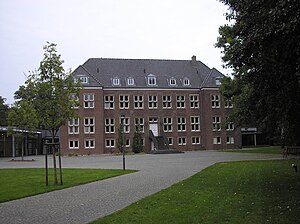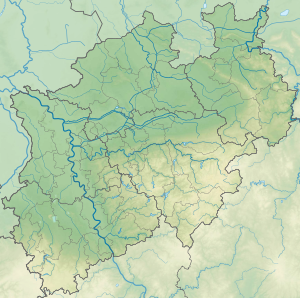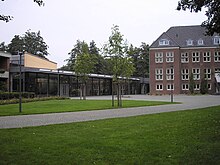Wasserburg cattle
| Wasserburg cattle | ||
|---|---|---|
| Alternative name (s): | Good op gen poll | |
| Creation time : | 1654 | |
| Castle type : | Niederungsburg | |
| Conservation status: | Received or received substantial parts | |
| Place: | Cattle | |
| Geographical location | 51 ° 48 '20.6 " N , 6 ° 7' 47.4" E | |
|
|
||
The moated castle of cattle is a former manor in the village of cattle , which is now part of the city of Kleve . The Wasserburg has served as the seat of the "Catholic Heimvolkshochschule Wasserburg Cattle" since 1956 .
history
The moated Cattle Castle was built in 1654 as Gut op gen Poll by the married couple Herman Hecking and G. Ranwick. In 1666 the Great Elector of Brandenburg bought the estate as a hunting lodge. Under its governor Johann Moritz von Nassau-Siegen it was included in the Klever Gardens . The moated castle was probably redesigned for the first time at the beginning of the 18th century. Another renovation took place in 1851, with only a few sandstone ornaments remaining from the original facade design.
After the Second World War, the Kleve district initially acquired the property and had the worst damage repaired without any specific use in mind. In 1954 the moated castle was sold to the diocese of Münster , which in 1956 relocated the country folk high school from Freudenberg near Kleve. In the previous renovations, a second transverse wing was added to the building so that the facade was given a symmetrical appearance. However, the roof turrets and the two-flight entrance stairs were removed without any need, and the appearance of the facility was significantly impaired. In the following years, an additional wing was added to the rear of the old moated castle and a free-standing chapel was built between 1966 and 1968 . By 1974, the Heimvolkshochschule was expanded to include a large new building, and by 2004 the entire facility was completely renovated and a new reception, kitchen and room wing added.
Folk high school
The Catholic Heimvolkshochschule is a rural adult education center that offers more than 250 seminars annually in the buildings of the Wasserburg in the fields of artistic and creative education , women's, senior and health education , family education and religious education as well as political and rural social education . Since 2007, it has formed a network with the educational institutions, the Franz Heat House Academy in Münster, which are also supported by the Diocese of Münster , and the Catholic rural community college "Schorlemer Alst" in Warendorf - Freckenhorst . It is an adult education institution recognized according to the 1st North Rhine-Westphalian Continuing Education Act (WbG) and a full member of various umbrella organizations at state and federal level:
- State working group for Catholic adult and family education in North Rhine-Westphalia e. V. (LAG KEFB), Cologne
- Working group of educational institutions and academies (folk high schools) in North Rhine-Westphalia e. V., Koenigswinter
- Association of training centers in rural areas e. V. (VBLR), Berlin
literature
- Manuel Hagemann: Brief building history of the Wasserburg cattle . In: Perspektiven 2002 . Pp. 47-51


